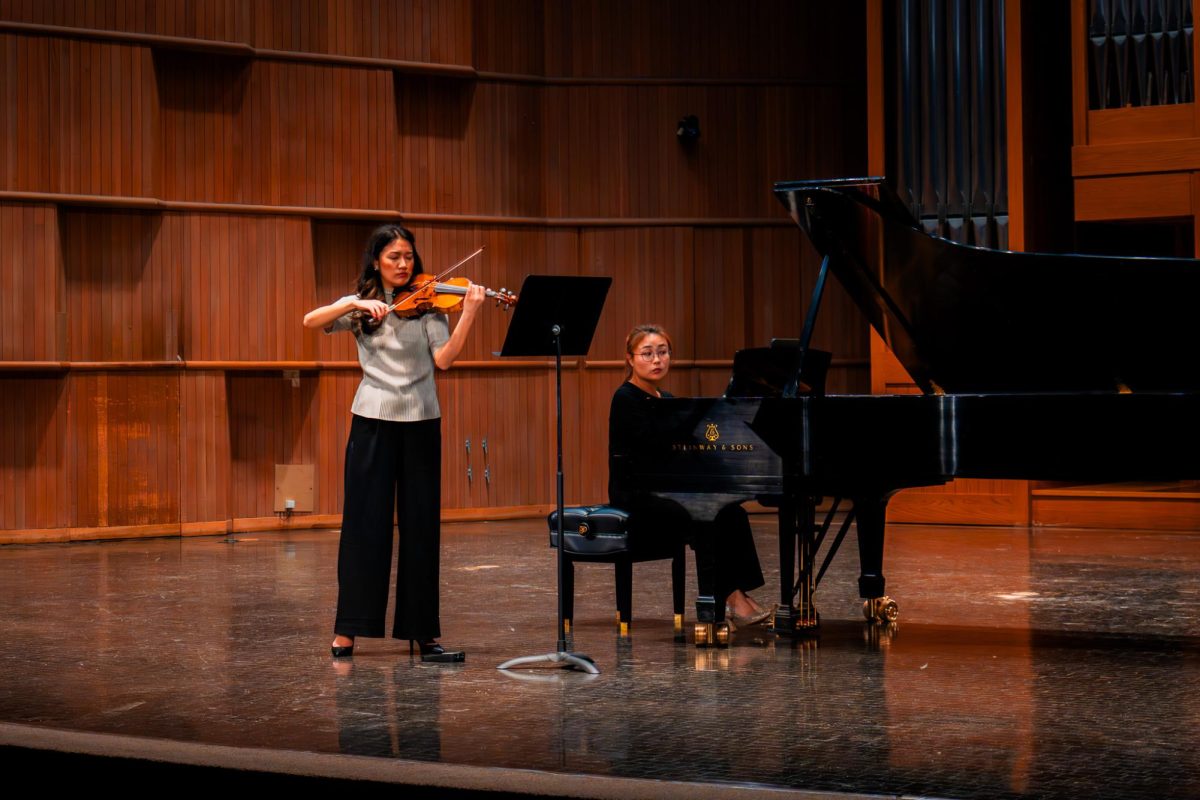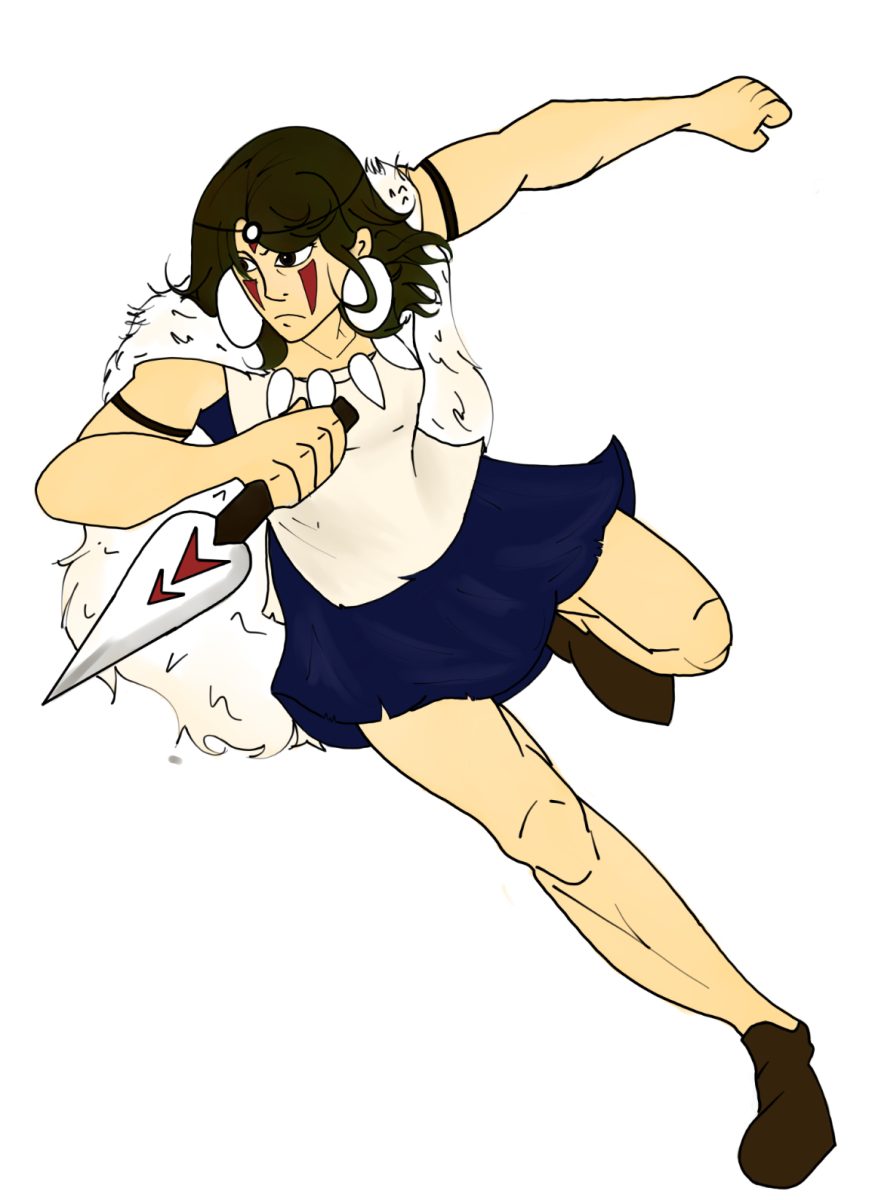
SPOILER WARNING
“Anora,” directed by Sean Baker, took the Palme d’Or at the Cannes Film Festival in May. It has been in talks for a Best Picture nomination and currently sits at 167 on Letterboxd’s Official Top 250 Narrative Feature Films.
The film opened in Los Angeles and New York theaters on Oct. 18 and will progressively begin expanding its release on Nov. 1. San Antonio theaters currently have the first screenings set for Nov. 8 at the Alamo Drafthouse Park North and Santikos Embassy 14.
This past weekend, Alamo Drafthouse South Lamar in Austin hosted early screenings as part of Fantastic Fest. Formats of the film varied between 35mm and 2D digital — with some of the digital showings including a live Q&A with Brittney Rodriguez, who played Dawn in the film.
The romantic dramedy explores the relationship between Russian sex worker Anora — Ani for short — played by Mikey Madison and the son of a Russian oligarch Ivan, played by Mark Eydelshteyn. Its depiction of sex work pushes the conversations held surrounding modern media without alienating audiences.
With “Anora,” Baker further investigates the death of the American dream and the misguided hope granted to the working class by those in power. Along the way, Ani receives a glimmer of a life should only dream of — filled with promises of Disney World, a diamond ring and a Russian sable coat.
The audience first meets Ani in the club — where she works as an exotic dancer — dancing to Take That’s “Greatest Day” in the red glow of the night. Viewers enjoy less than 10 minutes with the titular character before being introduced to Ivan, and the plot’s shenanigans ensue.
This quick-paced introduction sets the stage for the next 120 minutes of the film while granting viewers insight into the relentless passage of time in Ani’s non-stop work schedule. The film will not let up. The audience will be bludgeoned with laughs, tears and happiness to the point of being overwhelmed.
Following their meeting, Ani attends Ivan’s New Year’s Eve party where the two begin to show a connection much deeper than just business. Madison adds subtle nuance to her character to demonstrate the evolving emotions. During the countdown to the new year, Ani catches sight of Ivan and loses focus, hinting at her beginning to fall in love with Ivan. This was just one of the details added by Madison and is both a testament to the actress and Baker’s trust of the actors he works with.
In an extremely fast-paced montage, Baker depicts the two hanging at the pool, playing poker and having lots of sex on their Las Vegas vacation. The sequence explores the immediate pleasure brought about by the relationship. Ivan revels in sex with Ani, and Ani enjoys a life she would not otherwise have access to.
The scene ends on a much slower note with the couple lying in bed. Instead of cutting back and forth between close-ups of Ani and Ivan, Baker maintains a wide angle of the two. The intimacy feels contrived. The conversation has no authenticity. Baker shoots wide to create emphasis on the action of dialogue and the events that will unfold rather than the emotional state of the pair. The scene culminates in the two deciding to get married and a hard cut to another montage. Shouts of “He’s my husband” and “We’re married” fill the theater as Baker switches to a hand-held camera to convey the fairytale nature of the sequence — a terrific callback to “The Florida Project.” Rather than tons of cuts in the scene, Baker swoons the lens around the couple creating a lighter-than-air quality to events on screen; it is a dream-like sequence.
Baker does little to subvert the expectations of the audience. Unafraid to take the audience by the hand and guide them along the journey, viewers are completely aware of where Baker takes the film, but everytime the tension and emotion reaches new heights, Baker pushes the audience to feel deeper and confront the complicated emotions orchestrated by Madison’s performance and the film’s phenomenal editing. This back-and-forth in speed mimics the shift between hope and bone-crushing tragedy found in the film.
The meeting of Toros, Igor, Garnick and Ani most exemplifies the overwhelming and juxtaposing nature of emotion within the movie. The scene features tons of slapstick comedy as Garnick and Igor endure a formidable fight with Ani, which leaves Garnick with a broken nose and concussion.
While the audience laughs at the comedic fear and bickering of the two men, Ani sits tied up — fearful of what will ensue.
Viewers must quickly switch gears as Baker cuts to an extreme close-up of Ani. Madison plays with her eyes and lips guiding the audience through fear, exasperation and determination. This hard cut to silence and Ani clashes the perspective of the upper class with the livelihood of the working class.
This is just another day for the rich. Another problem must be solved; another marriage must be annulled. Once done, Ivan will return to Russia to live a life full of met needs while Ani will be forced back into survival mode.
For Ani, her world has come crashing down — reduced to a week-long vacation. Time has been weaponized against her. It constantly drives her towards a tragic ending of the marriage — never giving her or the audience the ability to breathe or fully grasp the events occurring on screen. occurring.
This weaponization of time remains a motif in the film. At the beginning of the film, Ani’s request a week off, and her boss quickly turns it down. When mentioning to her sister that she will be gone till the following Tuesday, her sister becomes interrogative. Ani does not have time. She does not deserve it.
In the final act of the film, after being forced to sleep in a car overnight and fly to Las Vegas and back in less than 24 hours — never having enough time to process the unfolding events — Ani grows weary and eventually gives up on her marriage to Ivan and any chance of a fairytale ending.
As the audience endures this journey, they too grow exhausted. Unlike Ani, moviegoers never give up hope. Even when she returns home, the viewer yearns for Ani to smile just once more; several scenes give her the room to do so. This will not happen.
In an ending for the ages, Ani sits in a car with Igor as she prepares to return to her normal life The scene set against snow suggests the possibility of a happy ending. Perhaps in this moment, Ani will be reborn into Anora, indicated by the association of Russia and snow. She never seems to claim her name, as she feels rejected by the community that left her to fend for herself. She is alone. She is simply Ani — nothing more and nothing less.
As Ani prepares to step into the snow and back into her life of endless work, she closes the door of the car and turns around looking directly into the camera.
There exists no opportunity for rebirth. The water has frozen into snow. Her mistakes and traumas cannot be whisked away. They are stagnant — a part of her.
Removing her coat, she sits on top of Igor in preparation for sex. When Igor tries to kiss her, Ani grabs his hands and falls apart crying in his arms. The audience sits with Ani sobbing for a minute — waiting for the next scene to occur and hoping for Ani’s happy ending; the camera cuts, and the credits roll.
Baker pulls no punches in “Anora.” The audience embarks on a roller coaster of emotions that leaves them hopeless and broken. Nothing more than the moments lived and their end remains.
Mikey Madison delivers a performance all but guaranteed to collect trophies this upcoming awards season. With Baker at the height of his powers, viewers will be in awe of “Anora.” The film pushes audiences out of their comfort zone and beckons the viewer to divert from being pragmatic and instead lean into the emotional. Reason strips Ani of hope, but sentiment leaves viewers wishing that one day Anora will get her fairy tale ending. As a tour-de-force tragedy that pushes audiences out of their comfort zone regarding a topic typically shied away from by mainstream media, “Anora” is deserving of all the applause and accolades it will surely receive.










